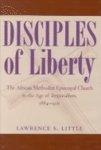
Book Summary
In the late nineteenth and early twentieth centuries, the African Methodist Episcopal Church provided an ideological foundation for the African American community that was truly world-embracing. While generally identified with the pursuit of liberty for African Americans, the church's concerns can now be seen to have extended far beyond U.S. borders. In this new study, Lawrence Little describes how the A.M.E. Church reacted to American foreign policy in the years from the partition of Africa in 1884 to the U.S. invasion of Haiti in 1916. By examining and analyzing church rhetoric and actions in response to imperialism and oppression, he shows how the A.M.E. Church pursued the global application of liberty and identified with oppressed peoples around the world, regardless of race. As church leaders, editors of church periodicals, and laypersons reacted to such issues as U.S. conduct during the war with Spain or involvement in Caribbean countries, they found an opportunity for mission work on behalf of American-style liberty in those areas brought into the U.S. orbit. Yet, because this liberty was often accompanied by American-style racism and imperialism, it sometimes proved difficult for church members to reconcile the promise of U.S. ideals with reality. As Little shows, interaction between theology and politics created conflict within the church as its leaders sought not only to enlighten the African American community but also to influence domestic and world opinions. Disciples of Liberty takes a more global perspective than previous studies of African American denominations. It describes the wide range of issues that engaged the A.M.E.: the Irish struggle for home rule,British imperialism during the Boer War, persecution of Russian Jews, and the Boxer Rebellion, among many others. Further, it examines the attitudes of ordinary elders and laypersons, showing that they closely followed current events and demonstrating that A.M.E. leadership also was exercised from the bottom up. A century ago, the A.M.E. Church recognized that prejudice at home was also a reflection of imperialism abroad. By focusing on the theme of liberty, Little's study offers new insights into that era and shows how African Americans developed a stand on universal human rights and self-determination.
Book Details
| Book Name | Disciples Of Liberty: The African Methodist Episcopal Church In The Age Of Imperialism, 1884-1916 |
| Author | Lawrence S. Little |
| Publisher | University Of Tennessee Press (Aug 2000) |
| ISBN | 9781572330856 |
| Pages | 264 |
| Language | English |
| Price | 2292 |
